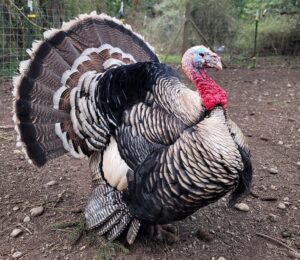Today’s Word from Deacon Amy…
We’ve all heard about prideful peacocks, but what about the lowly turkey? It’s about this time every year that our handsome toms start to strut their stuff, fanning their tails and parading around the barnyard, trying to catch the attention of a hen. They are a perfect visual representation of pride.
These toms remind me of a conversation I had with a young man a few weeks ago. He asked me about pride; is it always a bad thing? He really got me thinking – is there a simple answer to this question? As with many theological questions, no, I don’t think there is a simple answer to this one.
Let’s start, first, with finding a definition for the word “pride.” Looking at The American Heritage Dictionary, we find that there are several definitions. A few of them are:
• A sense of one’s own proper dignity or value; self-respect.
• Pleasure or satisfaction taken in an achievement, possession, or association.
• Arrogant or disdainful conduct or treatment; haughtiness.
These definitions really vary – from dignity to pleasure to arrogance. I can’t think of another word with so many variable connotations. In continuing to delve into this mysterious theme of pride, let us turn to the Bible.
Reading through the Old Testament, there are dozens of references to pride in an undesirable way:
“Pride goes before destruction, and a haughty spirit before a fall.” Proverbs 16:18
“I will punish the world for its evil, and the wicked for their iniquity; I will put an end to the pride of the arrogant, and lay low the insolence of tyrants.” Isaiah 13:11
These passages remind us of the risk of taking personal credit for our successes and neglecting to honor our Creator who has supplied us all with various gifts and abilities. Perhaps it is in our nature to be prideful. To rely on ourselves alone. These passages warn us of the danger therein.
Besides, none of us like to spend too much time with people who are overly boastful, and we certainly don’t enjoy working on team projects when another member prefers to take all of the credit.
Let’s turn, then, to the New Testament, where we find a different type of reference to pride. When speaking to the people of Corinth, Paul said, “I often boast about you; I have great pride in you; I am filled with consolation; I am overjoyed in all our affliction.” 2 Corinthians 7:4
Here, Paul expresses pride not in himself, as we were warned against earlier, but pride in the followers of Christ. This is a different type of pride. This aligns more, perhaps, with a parent who is proud of a child who is making good choices in life, or making a positive impact in the world.
So… where does this leave us? Is it bad to be proud of ourselves for reaching a goal, or accomplishing a difficult task? Personally, I don’t think that’s the type of pride that we are being warned against.
And I absolutely believe that we could correctly use the word “proud” when considering how God feels about us, much as a loving parent does, when we use the gifts that we have been given to do good in this world.
As a child, it always made me feel good to know that my parents were proud of me. As a parent, I often feel that I’m about to burst with pride over my children. My students, too, make me feel unbelievably proud at times.
This was a long and winding response to what seemed a simple question: is pride always bad? So, to sum it up, I would say, yes and no; sometimes and always; it really kind of depends on the situation. That’s just about as clear as mud, isn’t it?
Maybe I’ll just stick with the turkeys. They really are quite impressive.
Deacon Amy



